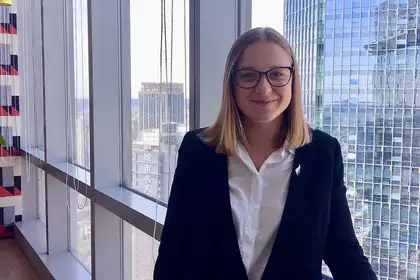
Massey Master of Science student Caitlyn Poole in the Ministry of Foreign Affairs and Trade office in the New Zealand Consulate in Chengdu, China.
Massey University Master of Science (Animal Science) student Caitlyn Poole knows if we are to feed the world, international relationships are key.
Miss Poole has been in China since July thanks to a Prime Minister’s Scholarship for Asia, designed to help young people with their understanding of other cultures and build international skills by studying anywhere in Asia.
She chose to use the scholarship to study Mandarin in China, undertaking a six-week language course and a further 30-40 hours a week at Chengdu University for six months.
“I’m really honoured to have this opportunity,” says Miss Poole. “Success in China is built on relationships – it’s really important to be able to communicate and understand how people in China work and do business.”
This is her second time in China, having worked there for three months earlier this year as an intern for the Ministry of Foreign Affairs and Trade, in the New Zealand Consulate - an experience made possible by an Asia New Zealand Foundation Business Internship Scholarship.
It is a long way for a kid who grew up in rural South Taranaki and attended Sacred Heart Girls’ College in Hamilton. She came to Massey on two DairyNZ scholarships. Her first scholarship went towards her Bachelor of AgriScience at Massey, where she spent a year in Brazil on an exchange programme. She learned Portuguese and worked on New Zealand-owned dairy farms for several weeks in her holidays.
“Working on Kiwi farms in Brazil gave me tremendous insight into dairy farming operations overseas,” she says. “It was really interesting to see how New Zealand farming practices can be successfully applied in other parts of the world and adapted for local conditions.”
Her second scholarship went towards her Master of Science in animal science, which focused on the association between supplementary feeding and the post-grazing residual.